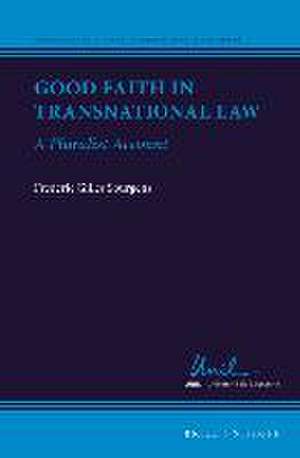Good Faith in Transnational Law: A Pluralist Account: International and Comparative Business Law and Public Policy, cartea 3
Autor Frédéric Gilles Sourgensen Limba Engleză Hardback – 21 sep 2022
Preț: 640.05 lei
Preț vechi: 780.55 lei
-18% Nou
Puncte Express: 960
Preț estimativ în valută:
122.48€ • 130.97$ • 102.12£
122.48€ • 130.97$ • 102.12£
Carte indisponibilă temporar
Doresc să fiu notificat când acest titlu va fi disponibil:
Se trimite...
Preluare comenzi: 021 569.72.76
Specificații
ISBN-13: 9789004522374
ISBN-10: 9004522379
Pagini: 427
Dimensiuni: 155 x 235 mm
Greutate: 0.75 kg
Editura: Brill
Colecția Brill | Nijhoff
Seria International and Comparative Business Law and Public Policy
ISBN-10: 9004522379
Pagini: 427
Dimensiuni: 155 x 235 mm
Greutate: 0.75 kg
Editura: Brill
Colecția Brill | Nijhoff
Seria International and Comparative Business Law and Public Policy
Notă biografică
Frédéric Gilles Sourgens, Ph.D. (Law), Johann Wolfgang Goethe Universität, Frankfurt a.M., is the Senator Robert J. Dole Distinguished Professor of Law at Washburn University School of Law. He has published extensively on transnational law, international energy law, international environmental law and legal theory, including A Nascent Common Law (Brill, 2015).
Cuprins
Preface
1Introduction
2What Is “Transnational Law”?
1 The Classic Conflict of Laws Approach
2 A Clash of Principles
2.1Globalization’s Liberal Aspirations
2.2The Internalization of Globalization in State Law
2.3Good Faith and the Clash of Principles
3 The Descriptive Blind Spot
4 Two-Faced Faith?
5 Conclusion
3Good Faith as Pluralist Principle
1 The Point of Transnational Law
2 The Pluralist Starting Point
3 Good Faith and Legal Pluralism
3.1Why Good Faith
3.2Acknowledging Functional Differences
3.3Good Faith as Obligation of Conduct
3.4Good Faith as Communication
3.5Good Faith as Other Regard
3.6Good Faith as Unity of Difference
4Pluralist Good Faith in the Lex Mercatoria
1 The Test Case of the New Lex Mercatoria
2 Good Faith in the New Lex Mercatoria
2.1Good Faith and Other Regard
2.1.1 Other Regard in the General of Principle of Good Faith and Fair Dealing
2.1.2 Other Regard and Abuse of Rights
2.1.3 Other Regard and Clean Hands
2.1.4 Other Regard and Implied Obligations
2.1.5 Conclusion
2.2Good Faith and Communication
2.2.1 Forfeiture and the Duty to Communicate
2.2.2 Communication and Inconsistent Behavior
2.2.3 Duty to Renegotiate
2.2.4 Pre-contractual Liability?
2.2.5 Conclusion
3 The Yardstick of Good Faith
3.1The Authoritative Language of Good Faith
3.2Good Faith and Economic Utility
3.3Good Faith and Quasi-Moral Duty
4 Chaos in a Faithless World
5 Good Faith as Driver of Self-Regulation
6 A First Order Conception of Pluralist Good Faith in Transnational Law
7 Conclusion
5Reflexive Good Faith
1 A Model for Polycentric Norm Generation in Transnational Law
2 Good Faith and Social Dimension of Polycentric Transnational Norm Generation
3 Good Faith and the Substantive Dimension of Polycentric Transnational Norm Generation
4 Good Faith and the Temporal Dimension of Polycentric Transnational Norm Generation
5 Good Faith and Legal Life Cycles
6 A Second Order Conception of Pluralism
7 Conclusion
6Good Faith as Stress Fields
1 Re-entry and Stress Fields
1.1Three Good Faiths
1.1.1 Pragmatic Good Faith
1.1.2 Utilitarian Good Faith
1.1.3 Constructivist Deontological Good Faith
1.2Stress Fields
2 The Constitutional Moment as a Stress Field
2.1Stress Testing Operational Closure
2.2Stress Testing Structural Couplings
2.3Stress Testing the Other Side of Structural Couplings
3 Conclusion: Meeting the Moment
7Conclusion
Bibliography
Index
1Introduction
2What Is “Transnational Law”?
1 The Classic Conflict of Laws Approach
2 A Clash of Principles
2.1Globalization’s Liberal Aspirations
2.2The Internalization of Globalization in State Law
2.3Good Faith and the Clash of Principles
3 The Descriptive Blind Spot
4 Two-Faced Faith?
5 Conclusion
3Good Faith as Pluralist Principle
1 The Point of Transnational Law
2 The Pluralist Starting Point
3 Good Faith and Legal Pluralism
3.1Why Good Faith
3.2Acknowledging Functional Differences
3.3Good Faith as Obligation of Conduct
3.4Good Faith as Communication
3.5Good Faith as Other Regard
3.6Good Faith as Unity of Difference
4Pluralist Good Faith in the Lex Mercatoria
1 The Test Case of the New Lex Mercatoria
2 Good Faith in the New Lex Mercatoria
2.1Good Faith and Other Regard
2.1.1 Other Regard in the General of Principle of Good Faith and Fair Dealing
2.1.2 Other Regard and Abuse of Rights
2.1.3 Other Regard and Clean Hands
2.1.4 Other Regard and Implied Obligations
2.1.5 Conclusion
2.2Good Faith and Communication
2.2.1 Forfeiture and the Duty to Communicate
2.2.2 Communication and Inconsistent Behavior
2.2.3 Duty to Renegotiate
2.2.4 Pre-contractual Liability?
2.2.5 Conclusion
3 The Yardstick of Good Faith
3.1The Authoritative Language of Good Faith
3.2Good Faith and Economic Utility
3.3Good Faith and Quasi-Moral Duty
4 Chaos in a Faithless World
5 Good Faith as Driver of Self-Regulation
6 A First Order Conception of Pluralist Good Faith in Transnational Law
7 Conclusion
5Reflexive Good Faith
1 A Model for Polycentric Norm Generation in Transnational Law
2 Good Faith and Social Dimension of Polycentric Transnational Norm Generation
3 Good Faith and the Substantive Dimension of Polycentric Transnational Norm Generation
4 Good Faith and the Temporal Dimension of Polycentric Transnational Norm Generation
5 Good Faith and Legal Life Cycles
6 A Second Order Conception of Pluralism
7 Conclusion
6Good Faith as Stress Fields
1 Re-entry and Stress Fields
1.1Three Good Faiths
1.1.1 Pragmatic Good Faith
1.1.2 Utilitarian Good Faith
1.1.3 Constructivist Deontological Good Faith
1.2Stress Fields
2 The Constitutional Moment as a Stress Field
2.1Stress Testing Operational Closure
2.2Stress Testing Structural Couplings
2.3Stress Testing the Other Side of Structural Couplings
3 Conclusion: Meeting the Moment
7Conclusion
Bibliography
Index





